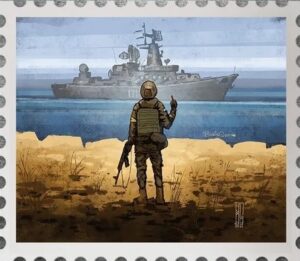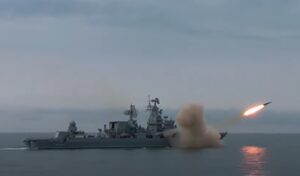 I don’t know if you’ve played the “Battleship” game. The idea is to locate the enemy’s ships and sink them by firing missiles at blank game board spaces. You can get the board game here or play it online here.
I don’t know if you’ve played the “Battleship” game. The idea is to locate the enemy’s ships and sink them by firing missiles at blank game board spaces. You can get the board game here or play it online here.
Countries play real-life “Battleship,” too. The Moskva (ex-Slava), flagship of Russia’s Black Sea fleet (photo below, profile here), sank on April 14, 2022.
The Moskva is the ship Ukrainian defenders of Snake Island flipped off (see my posting here). This was Ukraine’s “Bastogne” moment. In 1945, during Hitler’s Ardennes offensive (aka the “Battle of the Bulge”), the commander of America’s 101st Airborne Division surrounded at the village of Bastogne famously replied to a German surrender demand with the word “Nuts.”
Similarly, but employing 21st century language, the Snake Island defenders replied to the Russian warship’s surrender demand by giving them a finger and suggesting they perform a physically impossible sexual act on themselves. (I won’t use their actual words in case children read this.) Ukraine commemorated the incident with a postage stamp (pictured above).
Anyway, there’s two different stories about why the Moskva sank. Ukraine claims it hit the ship with missiles; Russia claims it caught fire. In any case, it was disabled, and according to the Russians was being towed to port when it tipped over and sank in a storm.
It looks like a feather in Ukraine’s cap, but how big a deal is Russia’s loss of this ship? Not very, Reuters says (here). The ship was built in Ukraine in the 1970s, commissioned in 1983, and Russia claims it was scheduled to be scrapped 5 years from now. A Russian PR flack said it was “very old” and had “more status value than combat value.” That might be true. If the Ukrainians whacked it, that suggests it was a sitting duck.
The Moskva had 16 cruise missile launchers, but Reuters points out that “Russia has sufficient resources to maintain a blockade of Ukrainian ports” and can “hit targets inside Ukraine with other missile systems,” according to military experts. In a war, you reckon in terms of military significance, and if losing a ship doesn’t have any effect on the course of a battle or the war, then its loss isn’t militarily significant, and a smart opponent wouldn’t put a lot of resources into going after it.
Still, intangibles can be a big factor in war. Destroying Russia’s biggest ship in the theater could give Ukraine’s forces a big morale boost, and at the same time further undermine Russian troops’ already shaky morale. It sends a message to them that they’re up against a better military, which has implications for their own prospects of surviving the war that won’t be lost on them.
So, the real significance of Moskva’s sinking may be what Basil Liddell-Hart termed the “moral factor” in war, which loosely translated means an army could lose a war simply because its soldiers feel their side is getting its ass kicked, which makes enthusiasm for further fighting hard to come by. I’m not saying Russia’s invasion of Ukraine is anywhere near that point yet. But losing a big ship and its firepower isn’t, shall we say, helpful to Russia’s cause.
Oh, and before I forget, good for the Ukrainians. And does it really matter whether they sank the ship, or Russian klutzes torched it themselves? Either way, Ukraine comes out on top in this skirmish.
Related story: What really happened? And what implications does it have for Taiwan’s defense? (Read story here)
